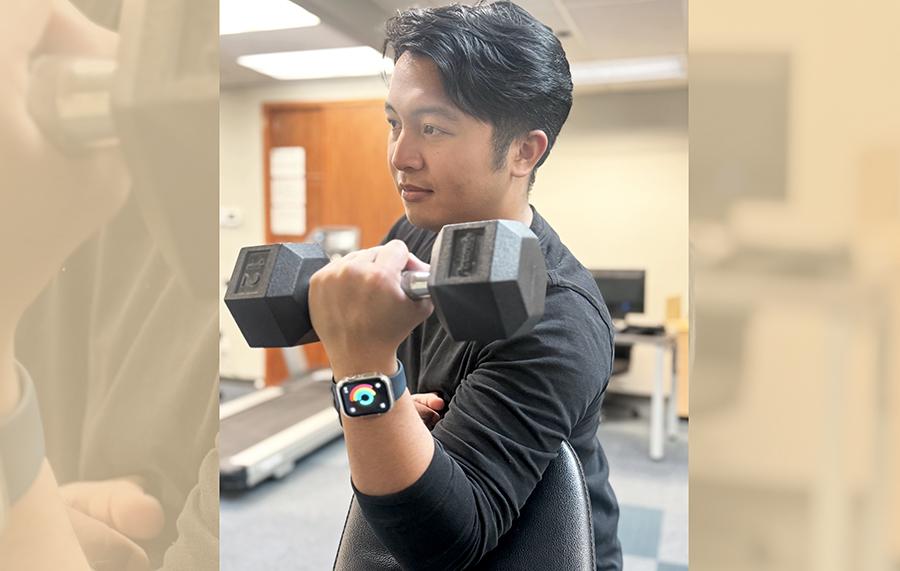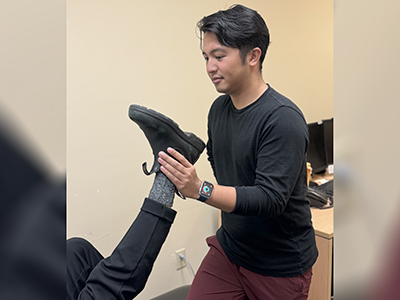
"I say yes to participate in research because it puts theories to the test and gives me an insider look at how research works."
– Gabriel Trinidad, Surrey
Wearable health monitoring devices have become omnipresent in the lives of Canadians. However, many questions have been raised about how accurate they are at measuring the vital signs and activity levels of wearers.
Among the sceptics is Gabriel Trinidad, a recent graduate from the Master of Physical Therapy program at the University of British Columbia (UBC) and a registered physical therapist. Trinidad has used a smartwatch to monitor and track his activity levels, sleep and heart rate, but often wondered about how much stock he should put into the readings that flash on the screen of his device.

“Prior to my graduate studies, I worked at an exercise clinic with clients living with a variety of chronic health conditions,” says Trinidad. “Clients often wore heart rate monitoring devices to track their activity levels during exercise training and to record their progress. Many clients held the belief that these devices were 100 per cent accurate.”
Trinidad’s eyes were opened to the shortcomings of certain wrist-worn heart rate monitors after participating in a research study that tested the accuracy of these devices on people with different skin tones. Led by Vancouver Coastal Health Research Institute researcher Dr. Janice Eng and postdoctoral fellow Dr. Stanley Hung, the study sought to determine whether monitor accuracy decreased as heart rate intensities increased, and whether the accuracy changed with different skin tones.
Fitness tracker inaccuracies raise concerns over use in health care and community settings
The study team recruited 25 healthy individuals under 50 years of age who were not living with any chronic health conditions. Participants’ skin tones were graded using the Fitzpatrick Skin Type Scale from one to six, in which six represents the darkest skin tone. Four to five participants from each skin tone category were included in the study. Trinidad, who is of Filipino descent, had a skin tone rating of five.
All participants donned a Fitbit Charge 5 and a Garmin vivosmart 5 wrist-based heart rate monitor in a lab setting while completing an exercise test that incrementally increased in difficulty. They also wore a Polar H10 heart rate chest strap, which uses similar technology to electrocardiogram, the current gold standard means of accurately tracking someone’s heart rate.

“We found that the Fitbit and Garmin both had acceptable accuracy across all skin tones while people were at rest while seated,” says Eng, who is also a University Killam Professor in the Department of Physical Therapy at UBC. “However, as participants exercised and raised their heart rates, the accuracy of the monitors worsened, particularly for people with darker skin tones.”
“These findings suggest a need for future wrist-based heart rate monitors to be properly tested across all skin tones.”
The monitoring technology within many watches helps to explain the discrepancy the study team observed, says Hung. The devices shine a beam of infrared light onto the skin to detect a person’s heart rate. Known as photoplethysmography (PPG), this optical technology detects blood volume changes in the small blood vessels in tissues to generate a heart rate reading. “This is commonly found in the hardware of these devices, though the exact specifications may vary, such as the wavelength of light used, the sensors’ orientation or the software or algorithms used to analyse the heart rate readings,” Hung adds.

“This infrared light can be absorbed by the melanin in our skin,” says Hung. “People with darker skin colour have more melanin, which can lead to greater light absorption. This may account for why the devices we tested often underestimated the heart rates of people with darker skin tones.”
“The inaccuracy of wrist-based heart rate monitors is problematic for several reasons: from equity and equality concerns to inaccurate treatment progression and monitoring in clinical and community settings, which can lead to insufficient or unsafe levels of exercise intensity,” Hung adds.
After learning of the preliminary results of the study, Trinidad is more cautious about recommending the use of wrist-worn heart rate monitors to his clients.
“From the lens of a physiotherapist, you want people to fully recover following an injury, so the better equipped they are to recover, the better their outcomes can be,” says Trinidad. “Now that I understand that the accuracy of these devices is questionable, I can educate my clients to be cautious about how and when to use this technology.”

On a personal level, Trinidad is also planning to find alternative methods to monitor his own day-to-day activities — such as using his hands to check his pulse — until further studies confirm the accuracy of the technology he uses or updated technology that accounts for darker skin tones is released.
“If my watch tells me that my sleep is really affected, I will probably take it with a grain of salt.”
This is one patient's story of participating in a research study. Your experience may differ. Learn about clinical trials before participating.


